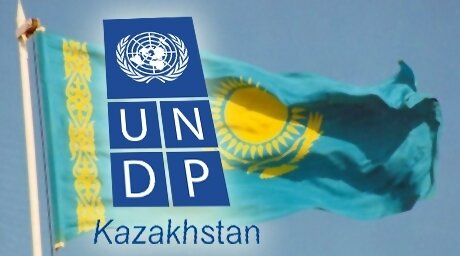
As part of the integration processes in the CIS, today one of the largest and closest Russia's partners is Kazakhstan. Thus, Kazakhstan is the most active member of the Customs Union, CSTO and other integration structures at the post-Soviet territories that have been created on Moscow's initiative.
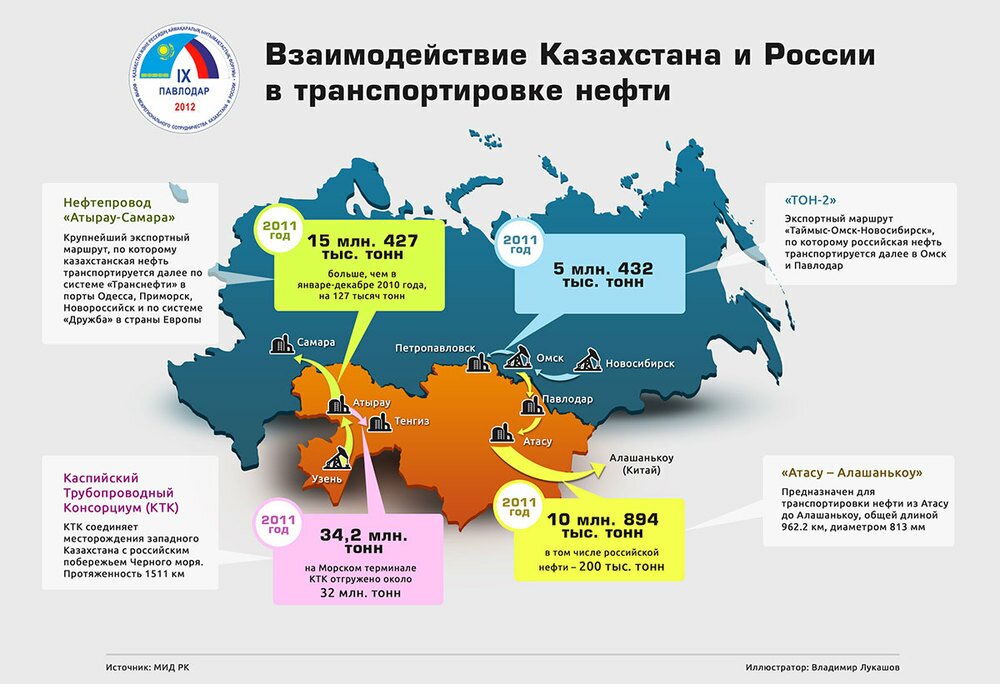
|
|
Cooperation between Kazakhstan and Russia in transportation of crude oil http://yvision.kz/ |
At this, Russia is one of the main trade partners of Kazakhstan. In particular, in 2012 the trade turnover between the two countries amounted to over 24 billion US dollars. According to the agreement between the parties, over the next ten years the above mentioned index will increase to 40 billion US dollars. At the same time, the Russian side has a leading position in the sphere of transportation of Kazakhstan's oil to foreign markets through the Caspian Pipeline Consortium, which connects the oil fields of western Kazakhstan with the Black Sea coast of Russia.
In its turn, Kazakhstan has been consistently supporting the Russian Federation's policy (security issues included) both, at the territories of the former Soviet Union and beyond. The above mentioned allows Kazakhstan to ensure its needs for arms and military equipment produced in Russia on favorable terms.
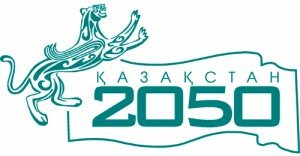 |
|
"Strategy" Kazakhstan - 2050": a new policy of the established state". President of the Republic of Kazakhstan Nursultan Nazarbayev's message to the people of Kazakhstan http://www.mk.gov.kz/ |
However, like other countries-Russia's partners, lately Kazakhstan has been leading an active policy of diversifying its foreign relations in political, economic and security spheres. The main directions of this policy were determined by the President of Kazakhstan N. Nazarbayev in the new “Strategy “Kazakhstan-2050”.
According to the document, it is supposed to activate innovative development of Kazakhstan, with the ultimate goal of entering the list of 30 most developed countries of the world, through building balanced relationships with foreign countries and international organizations included. At this, apart from the Russian Federation and countries of the Asian region, Astana's priority attention is given to deepening ties with Western countries and international organizations that play an increasingly important role in the realization of outer and inner interests of the Republic of Kazakhstan.
The reasons for this are the desire of Kazakhstan to reduce its dependence on Russia, which continues to practice the use of economic cooperation with other countries for achieving its political goals, and a greater potential of development of trade and economic ties with the European Union and the United States. Thus, despite the preservation of Moscow's leading positions in terms of trade with Kazakhstan, where it comes to other aspects of trade and economic cooperation between the parties, Russia is lagging behind Astana's Western partners.
The European Union
In terms of diversification of economic relations of Kazakhstan, today the main alternative partner of the country is the European Union. Thus, the EU is a leader in terms of investments into Kazakhstan's economy. In particular, from 1993 to 2012 inflows of direct investments from the EU countries amounted to about 70 billion US dollars (as compared with Russian investments that totaled only about 6 billion US dollars. This meets the economic potential of Russia which is more than ten times lower than that of the EU). At the same time, in 2012 the trade turnover between Kazakhstan and the EU exceeded 30 billion Euros (6 billion Euros more than the trade turnover between Kazakhstan and Russia).
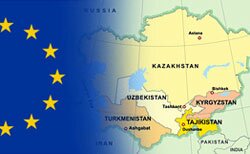 |
|
The European Union and Central Asia: Strategy for a New Partnership (adopted by the European Council on 21-22 June, 2007) http://www.easttime.ru/ |
The main spheres of cooperation between the EU and Kazakhstan are determined in the EU Strategy for Central Asia (adopted for the 2007 to 2013 period) and include implementation of joint projects in the spheres of economic development, trade, investment, energy, transport, environment, science and education.
At present the governing bodies of the EU are working on a new strategy for Central Asia up to 2014-2020 years. According to the document, the main direction of cooperation between the parties is the energy sector, namely increasing participation of European companies in the development of Kazakhstan's oil and gas fields, as well as creating alternative ways of transportation of oil and gas to Europe via the Caspian Sea (including construction and expansion of terminals for shipping and receiving oil and liquefied gas, building up capacities of the tanker fleet and ferry, etc).
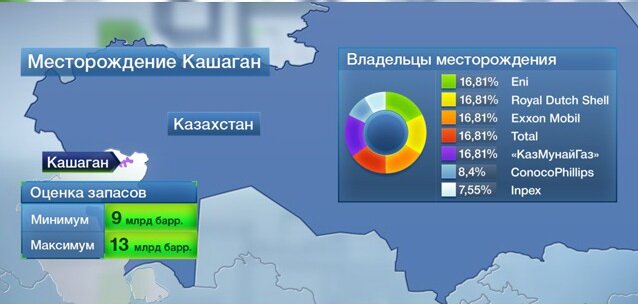
|
|
The owners of Kashagan oil field http://www.vestifinance.ru/ |
According to these plans, today one of the main energy projects in Kazakhstan with the participation of the EU member-states, is a joint development of the field “Kashagan” in the North-Eastern part of the Caspian Sea. Operator of this project is an international consortium led by the Italian company Eni, which includes a number of Kazakhstan and Western (European included) companies, including KMG Kashagan B.V. (A subsidiary of KazMunaiGas), Total (France), ExxonMobil (USA), Royal Dutch Shell (Denmark, Netherlands) and ConocoPhillips (USA).
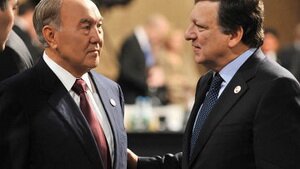 |
|
Kazakhstan and the European Union will sign a new comprehensive cooperation agreement, which will open a new era of relations http://www.avanturist.org/ |
Prospects of further strengthening cooperation between the EU and Kazakhstan were determined during the visit to Astana of the Head of the European Commission J. Barroso. During his meeting with the President of Kazakhstan N. Nazarbayev and Prime Minister S. Ahmetov, they agreed to intensify the negotiations of the parties about signing a new agreement on partnership and cooperation between Kazakhstan and the EU. Besides, J. Barroso expressed his support for Kazakhstan's plans to acquire the country's membership in the World Trade Organization.
Within the framework of general directions of cooperation between Kazakhstan and the EU, is also deepening of Astana's relations with individual European countries. Activation of relationships of the parties at the highest national level, including visits of the President of Kazakhstan N. Nazarbayev to Germany (February 2012) and France (in February of last year) and the visit of the British Prime Minister D. Cameron to Astana (June this year) testify to this. The result of these measures was the achievement of a number of agreements between Kazakhstan's government and business circles of these countries, including:
with Germany — on the development of large-scale cooperation between the two countries in mining, industrial and high-tech industries totaling over 4 billion US dollars. In particular, about 30 joint ventures in the field of advanced technology, and mining (including rare earth elements) are supposed to be created at the territory of Kazakhstan. In view of this, over the next few years the trade turnover between Kazakhstan and Germany will increase from the current 3.5 to 10 billion US dollars;
with France — on increasing the volume of bilateral trade (currently it makes around 6 billion US dollars per year) and French investments into Kazakhstan's economy (at the moment they are at the level of over 9 billion US dollars), as well as the French side's participation in implementation of the State Program of Forced Industrial-Innovation Kazakhstan and Strategic plan of the development till 2020 (including realization of projects of creation in Kazakhstan of the National Space Centre and the joint venture for the production of railway equipment);
with the UK —on strategic partnership between the two countries, as well as participation of British companies in a number of major projects in Kazakhstan totaling 1.1 billion US dollars (including the development of “Karachagan” oil field as well as increasing the capacity of the Caspian Pipeline Consortium).
NATO
Despite Kazakhstan's membership in CSTO, it actively cooperates with NATO. In particular, Kazakhstan is concentrating its efforts on enhancing its role in ensuring the transit of goods for International Security Assistance Forces in Afghanistan (ISAF) and their subsequent withdrawal from Afghan territory.
Lately similar “transit” agreements have been signed by Tajikistan with the United States, Britain, France, Italy and several other NATO countries. Under these agreements, Kazakhstan provides Alliance members with opportunities to use its airspace, airport, railway and port infrastructure on the Caspian Sea coast for the mentioned above purposes.
Spheres of cooperation between the parties were discussed at the beginning of August during a meeting in Astana of the Speaker of the Senate (upper house of parliament) of Kazakhstan K. Mami with the Head of the NATO Parliamentary Assembly K. Lamers. During the negotiations was pointed out the successful implementation of programs for modernization of the Armed Forces of Kazakhstan and the military education system of the country according to standards of the North Atlantic Alliance as well as preparation of plans for civilian emergency response.
 |
|
Kazakhstan is an active member of NATO's "Partnership for Peace", within the framework of which the country hosts annual multinational military trainings "Steppe Eagle" http://news.nur.kz/ |
Besides, Kazakhstan is an active member of NATO's “Partnership for Peace”, within the framework of which annual multinational military trainings “Steppe Eagle” are conducted. This year's trainings “Steppe Eagle-2013” were held in August on the military training ground of Air-mobile Forces of Kazakhstan in Almaty region of the country with the participation of units of the Armed Forces of Kazakhstan, USA, UK, Italy, Lithuania, Sweden, Ireland, Kyrgyzstan and Tajikistan. From Kazakhstan in the trainings participated subunits of the Landing Assault Brigade of Special Forces and Air Defense Forces of the country.
At the same time, continues the development of military-technical cooperation of Kazakhstan with individual NATO members. In particular, lately, as part of this cooperation has been signed a number of treaties and agreements between Kazakhstan and its partners, including:
with the United States — on deepening cooperation between the Defense Department of Kazakhstan and U.S. Department of Defense weapons, as well as creation at Kazakhstan's territory of the service center for maintenance and repair of American-made light aircraft that can be used for military and civilian purposes;
with France — on modernization of Kazakhstan's military airfield Shymkent (which is being used to ensure supplying French troops in Afghanistan) and to supply French armored vehicles into service of Kazakhstan's army;
with Turkey — on establishment of a joint venture in Kazakhstan to produce armored vehicles “Cobra”;
with Poland — on participation of the Polish party in modernization of armored vehicles and Air Defense systems of the Armed Forces of Kazakhstan, as well as on establishment of Kazakhstan's own production of armored combat vehicles in its own country.
USA
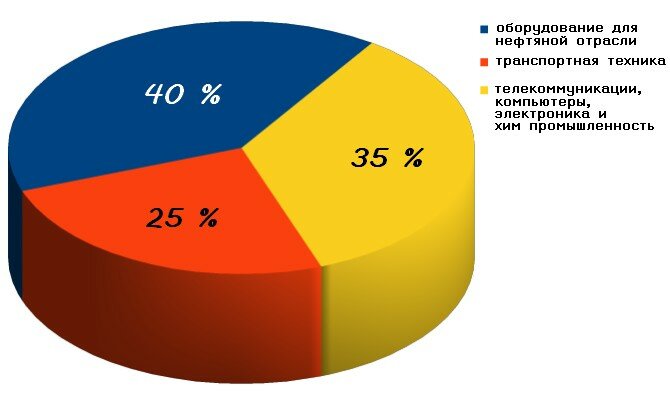 |
|
The structure of the USA's investments into the economy of Kazakhstan http://cc-sauran.kz/ |
Among Western countries, an important economic partner of Kazakhstan is the USA, that focuses on joint projects for the development of Kazakhstan's energy resources. By the volume of investments into Kazakhstan's economy of about $ 15 billion US dollars, the United States ranks second among major investors in Kazakhstan and works mainly in the oil and gas sector. At this, the volume of trade between the two countries is about 2.5 billion US dollars.
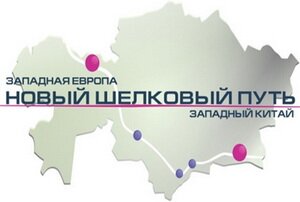 |
|
The USA promote in Central Asia the idea of the New Silk Road. According to Hillary Clinton, the aim of the project is to combine post-Soviet Central Asia with South Asia http://yvision.kz/ |
The strategic nature of the Kazakhstan — USA relations was confirmed during the visit to the USA of the Minister of Foreign Affairs of Kazakhstan Ye. Idrisov in July this year. In the course of work of the USA — Kazakhstan Commission on Strategic Partnership was observed priority for further participation of the parties in joint energy projects as well as Kazakhstan's strategic role in realization of the US initiative to establish a so-called New Silk Road, which has to connect Southeast Asia to Europe through Central Asia.
In particular, Kazakhstan has put forward the initiative to turn the city of Aktau into one of the largest in Central Asia transport and logistics centers for transportation of goods by land, air and sea. For this purpose the Kazakhstan's side proposes to expand the throughput capacity of the air and sea ports of Aktau and to build a new railway line to Afghanistan through Turkmenistan.
Besides, the United States reaffirmed their readiness to continue supporting Kazakhstan in the process of accession to the World Trade Organization.
Apart from the EU, NATO and the United States, Kazakhstan is increasing the scale of its cooperation with China and countries of the Middle East and Southeast Asia. This allows Kazakhstan to diversify its economic relations and enter new markets, thereby reducing its dependence on Russia. The latter is particularly important for Astana in the situation of increased political and economic contradictions with the RF.
At this, membership in the Customs Union is mainly of tactical importance for Kazakhstan in resolving the current economic problems of the country. In this context, the leadership of Kazakhstan actually considers the possibility of leaving the Customs Union because of the increasing problems in the organization, which has largely not been answering Kazakhstan's interests.

